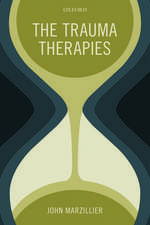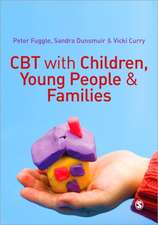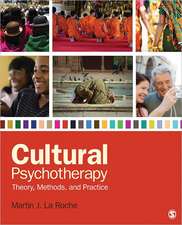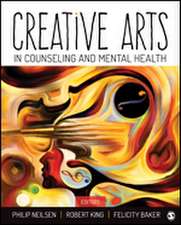Family Therapy: A Constructive Framework
Autor Roger Loween Limba Engleză Paperback – 17 iun 2004
`I think this is an important book that crystallises complex theory into a user-friendly model, using case material and discussions from the therapeutic community. A must have for counsellors working with families, this will form part of the recommended reading on the Family Counselling course' - Barbara McKay, Relate Head of Training, Relate News
`The book provides a good overview of a number of recent approaches to working with families as well as how the author thinks about them' - Stephen Bray, Nurturing Potential
`Roger Lowe achieves the almost impossible task of bringing together various theories, techniques and case examples in clear and accessible ways. Readers of all disciplines, from front-line hard-pressed practitioners to students on therapy and social work courses, will be grateful for the simple and, above all, useful way he tackles the burning questions that arise in working with the family group. Highly recommended!' - Harvey Ratner, Brief Therapy Practice, London
Family Therapy introduces practitioners to the principles of using a constructive and collaborative approach with families. The approach builds on a strengths-based philosophy and focuses on enhancing family resilience and competence in a way that is both time-efficient and comprehensive. It brings together skills from contemporary models such as solution-focused, narrative and conversational therapies and adapts them to the specific challenges of working with family relationships. It is the first book to systematically integrate these influential approaches and apply them to family work.
Setting out a clear framework for practice, Roger Lowe describes the key tasks for the therapist as:
· hosting meetings
· negotiating concerns, and
· evoking family members' personal and relationship resources.
The framework is designed to be clear but flexible, and to allow practitioners to adapt it to their own situational needs. For example, it suggests ways for practitioners to selectively 'borrow' from other therapeutic models while retaining a constructive orientation. It also explores ways in which therapists can use their 'inner' conversation during a session as a tool to overcome obstacles to the therapeutic process. Although there is a common belief that the approach is only suited to brief interventions, the author also describes ways of working constructively over a longer period of time.
Throughout the book, case studies are included to show how the constructive framework is used in practice and to highlight a range of challenging situations that may be encountered during family therapy.
Roger Lowe's book provides a refreshingly different approach to working with families, which chimes with the growing interest in constructive approaches. It is written for trainees and for practitioners who are interested in developing their skills in this collaborative and optimistic approach.
Preț: 464.99 lei
Nou
Puncte Express: 697
Preț estimativ în valută:
88.97€ • 93.15$ • 73.62£
88.97€ • 93.15$ • 73.62£
Carte tipărită la comandă
Livrare economică 05-19 aprilie
Preluare comenzi: 021 569.72.76
Specificații
ISBN-13: 9780761943037
ISBN-10: 076194303X
Pagini: 224
Dimensiuni: 156 x 234 x 13 mm
Greutate: 0.35 kg
Ediția:First Edition
Editura: SAGE Publications
Colecția Sage Publications Ltd
Locul publicării:London, United Kingdom
ISBN-10: 076194303X
Pagini: 224
Dimensiuni: 156 x 234 x 13 mm
Greutate: 0.35 kg
Ediția:First Edition
Editura: SAGE Publications
Colecția Sage Publications Ltd
Locul publicării:London, United Kingdom
Recenzii
`Roger Lowe achieves the almost impossible task of bringing together various theories, techniques and case examples in clear and accessible ways. Readers of all disciplines, from front-line hard-pressed practitioners to students on therapy and social work courses, will be grateful for the simple and, above all, useful way he tackles the burning questions that arise in working with the family group. Highly recommended!' - Harvey Ratner, Brief Therapy Practice, London
Cuprins
Introduction
Travelling Light
Hosting Family Members
Negotiating Concerns and Requests
Clarifying `Who Wants What?'
Evoking Possibilities
Working Constructively over Time
Using Inner Conversation
Borrowing from Other Frameworks
Responding to Challenges
Final Reflections
Travelling Light
Hosting Family Members
Negotiating Concerns and Requests
Clarifying `Who Wants What?'
Evoking Possibilities
Working Constructively over Time
Using Inner Conversation
Borrowing from Other Frameworks
Responding to Challenges
Final Reflections
Notă biografică
Roger left the southern mountains of West Virginia and joined the Air Force during the Viet Nam era. He traveled extensively, but his heart remained in the south. His writings reflect the southern attitude from those years ago.
After receiving an MBA in International Business, Roger worked for many years in the corporate world. He is an adjunct business instructor for a local university and a fulltime author and artist. His stories usually have backgrounds and characters that exist in a simpler time. No cell phones or other electronics distract his characters from experiencing the full adventure of just living.
Descriere
`I liked this book. Though I am not a family therapist, like most mental health nurses I try to bear in mind the family relationships of individuals I am working with. This is an enlightening text which not only offer a framework with which we can better understand the severe psychopathologies seen in forensic work, but also gives examples of how it may be used therapeutically' - Mental Health Practice
Roger Lowe's book provides a refreshingly different approach to working with families, which chimes with the growing interest in constructive approaches. It is written for trainees and for practitioners who are interested in developing their skills in this collaborative and optimistic approach.
Roger Lowe's book provides a refreshingly different approach to working with families, which chimes with the growing interest in constructive approaches. It is written for trainees and for practitioners who are interested in developing their skills in this collaborative and optimistic approach.














